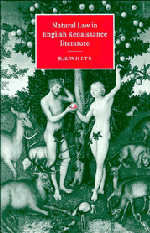Book contents
- Frontmatter
- Contents
- Preface
- Acknowledgments
- 1 Natural Law in history and Renaissance literature
- 2 The heritage of classical Natural Law
- 3 The reception of Natural Law in Renaissance England
- 4 Law and literature in sixteenth-century England
- 5 More's Utopia
- 6 ‘Love is the fulfilling of the law’: Arcadia and Love's Labour's Lost
- 7 ‘Hot temper leaps o'er a cold decree’: The Merchant of Venice and Measure for Measure
- 8 Shakespeare's The History of King Lear
- 9 Milton and Natural Law
- Epilogue: Hobbes and the Demise of classical Natural Law
- Appendix: Aquinas on the right to own private property
- Notes
- Select bibliography
- Index
5 - More's Utopia
Published online by Cambridge University Press: 17 September 2009
- Frontmatter
- Contents
- Preface
- Acknowledgments
- 1 Natural Law in history and Renaissance literature
- 2 The heritage of classical Natural Law
- 3 The reception of Natural Law in Renaissance England
- 4 Law and literature in sixteenth-century England
- 5 More's Utopia
- 6 ‘Love is the fulfilling of the law’: Arcadia and Love's Labour's Lost
- 7 ‘Hot temper leaps o'er a cold decree’: The Merchant of Venice and Measure for Measure
- 8 Shakespeare's The History of King Lear
- 9 Milton and Natural Law
- Epilogue: Hobbes and the Demise of classical Natural Law
- Appendix: Aquinas on the right to own private property
- Notes
- Select bibliography
- Index
Summary
The inscrutable economy of Thomas More's Utopia is capable of telling us more about its readers’ views than its author's. For a book written with such clarity, it is remarkable for the number of conflicting interpretations it has generated. Even what kind of book it is has been disputed. For one set of readers it is a straightforward Renaissance imitation of Plato's Republic, a vehicle for ideas never intended for practical application. For one set it is a satire on Plato's form, while for another it has only the most superficial connections with The Republic. It has been read as a purely ‘literary’ work, playing wittily with ideas, a youthful jeu d'esprit written by More for his fellow-humanist Erasmus in a period of enforced idleness. Connected with this reading is the approach through role-playing, the notion that Utopia is an exercise in exemplifying and exploring Renaissance political decorum, fitting one's conduct flexibly to the context of the moment. For still others who fundamentally believe the book is ‘literary’ in its kind, it becomes an analogue to The Tempest or a contribution to literature drawing on and satirising contemporary travel documents such as Vespucci's in More's time.
Opposed to the ‘literary’ readers are those who see More as a political theorist, an adviser to kings. Utopia then becomes a powerful example of rhetoric and fiction, as analysed in the previous chapter, persuading readers through reason, controlled language, and an appeal to common humanity to adopt and enact a political programme.
- Type
- Chapter
- Information
- Natural Law in English Renaissance Literature , pp. 107 - 133Publisher: Cambridge University PressPrint publication year: 1996

